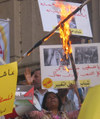Here in the Jerusalem office of Search for Common Ground, I work with Palestinians who have family in Gaza, and we have one staff member in Beirut. My Israeli relatives live in the south, within the range of Qassam rockets fired from Gaza by Hamas, and in the north, within the range of Katyusha rockets fired from Lebanon by Hezbollah.
The Re’ut Institute, an Israeli think tank run by an advisor to former Prime Minister Ehud Barak, poses two questions about Israel’s decision to treat Hezbollah as a rogue organization separate from the Lebanese government (even though it holds seats in parliament) while simultaneously going after Hamas by attacking Palestinian government buildings in addition to military targets.
Re’ut asks two questions:
- What is the organizing idea behind the differentiation between Hamas and Hezbollah?
- Does damage to the Palestinian political address serve Israel's strategic interests; or, alternately, does the 'protection' of the Lebanese government serve the battle against Hezbollah?
There is a related debate about what the policy should be toward states like Iran and Syria that use groups like Hezbollah and Hamas as proxies.
These are important questions for U.S. policy as well, both in the current crisis and in its approach to the “Global War on Terror.”
The Bush Doctrine makes no distinction between terrorist groups and the states that harbor them. This logical in some cases, as in the decision to wipe out Al Qaeda’s sanctuary in Afghanistan, but it has also lead to a confusion and misplaced use of force, as in the decision to pursue Saddam Hussein in lieu of Osama Bin Laden.
I believe that treating states and non-state actors interchangeably represents wishful thinking. States are easier to confront, both politically and militarily. As signatories to treaties and members of international organizations, they are tied into the international system and can be reached by both carrots and sticks. As entities with territory and borders, well, they don’t move. Someone wanting to bomb them can always find them. On the other hand, terrorist groups are elusive, with fewer assets, fewer channels for reward or punishment.
To answer Re’ut’s questions, there is a clear distinction between Hezbollah and Hamas at this time. Despite its close alliance with Syria and Iran, Hezbollah is acting as an independent militia, without the approval of the Lebanese government. Israel’s fight on its northern border is with Hizbullah. The strategy of “protecting” the Lebanese government is correct and should go even further. Broad strikes against the infrastructure of Lebanon, which have destroyed the country’s ports, airports, and roads, will only lead to the death of civilians and further embitter the conflict.
The issue of Hamas is much more complicated, not only because the organization has now been elected to lead the Palestinian Authority (through the Palestinian Legislative Council; rival Fatah leader Mahmoud Abbas still holds the presidency) but also because it is just one facet in the problem of Israel’s occupation of the West Bank and Gaza and the festering Israeli-Palestinian conflict.
I propose that anyone devising national security strategies for the U.S. and its allies needs to develop new approaches for dealing with non-state actors that go far beyond emotional responses to terrorism and sweeping linkages between states and other actors. Serious questions to answer include the following:
- What tools are available other than force for influencing the behavior of non-state actors?
- Does force in fact work? Do concepts such as deterrence and coercion have merit?
- Given that they cannot sign international treaties, how can non-state actors be held to their commitments (e.g. to ceasefires)?
- When should states be considered responsible for the actions of non-state actors?
I’m sure there are more questions, and I look forward to my colleagues’ responses. In the meantime, I suggest that non-state actors should be dealt with on their own terms—friend or foe. In confronting them, strategies should be designed to avoid punishing innocent civilians and to limit escalation to state-to-state conflict.




